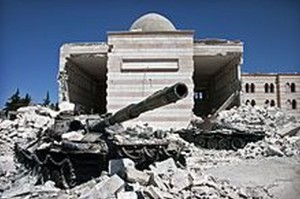They hope other like-minded militants will step up and do that, or perhaps Assad regime loyalists themselves.
 Gaza City, February 22 – Representatives of the Islamic Resistance Movement that took control of the Gaza Strip in early 2007 voiced frustration today at the emerging cease-fire agreement among various belligerents in the ongoing Syrian conflict, saying thay they have as yet been unable to find a way to violate that agreement as they did numerous ones during the last war with Israel in 2014.
Gaza City, February 22 – Representatives of the Islamic Resistance Movement that took control of the Gaza Strip in early 2007 voiced frustration today at the emerging cease-fire agreement among various belligerents in the ongoing Syrian conflict, saying thay they have as yet been unable to find a way to violate that agreement as they did numerous ones during the last war with Israel in 2014.
Hamas spokesmen Fawzi Barhoum and Moussa Abu Marzouk called a press conference this afternoon (Monday) to express their sense of being stymied by events elsewhere in the Middle East, where they lack the military presence or resources to undermine efforts to restore calm. The movement became accustomed to such a capacity in the summer of 2014, when Egyptian- and US-brokered cease-fire arrangements repeatedly broke down when Hamas fired rockets or mortars after the cease-fires officially took effect or significantly before they were set to expire.
“Before the Syrian Civil War erupted we could not have foreseen this sad situation,” lamented Barhoum. “We had our headquarters in Syria, in fact, and no small number of activists we could call in. However, we sided with the uprising that followed the Arab Spring, and [Syrian President] Basher Assad expelled us and had our offices closed. We couldn’t violate the emerging cease-fire even if we wanted to.” He expressed the hope that other like-minded militants would step up, or perhaps Assad regime loyalists themselves.
“It’s the kind of thing Hezbollah might do,” offered Marzouk, referring to the Lebanese Shiite group fighting on Assad’s side. “But we can’t demand a thing from them at this point. It’s a sensitive political issue. We’re trying to reach a rapprochement with Iran, Hezbollah’s main sponsor, but we’re Sunni and they’re Shiite, and our ambitions often collide. It can be a real letdown, being unable to destabilize a situation with an ongoing humanitarian crisis when that’s one of the things we do best.”
Marzouk consoled himself with the fact that at least the movement’s political leader abroad, Khaled Mashal, could continue living the high life at a luxury hotel in Qatar regardless of his organization’s inability to destroy a Syrian cease-fire. “Hamas can still accomplish many of its most important functions, such as enriching its senior officials at the expense of the suffering Gaza population, and investing foreign aid meant for reconstruction in more tunnels through which to attack Israel while thousands of Gazans remain homeless through yet another winter. We’re tops at that.”
So troubled were the two officials by their inability to undermine a Syrian cease-fire that they forgot to add the obligatory accusations that Israel was the source of all the region’s problems.




